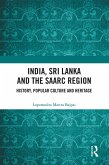This book provides a set of fresh and compelling interdisciplinary approaches to the enduring phenomenon of the guru in South Asia. Moving across different gurus and kinds of gurus, and between past and present, the chapters call attention to the extraordinary scope and richness of the social lives and roles of South Asian gurus. Prevailing scholarship has rightly considered the guru to be a source of religious and philosophical knowledge and mystical bodily practices. This book goes further and considers the social engagements and entanglements of these spiritual leaders, not just on their own (narrowly denominational) terms, but in terms of their diverse, complex, rapidly evolving engagements with 'society' broadly conceived. The book explores and illuminates the significance of female gurus, gurus from the perspective of Islam, imbrications of guru-ship and slavery in pre-modern India, connections between gurus and power, governance and economic liberalization in modern and contemporary India, vexed questions of sexuality and guru-ship, gurus' charitable endeavours, the cosmopolitanism of gurus in contexts of spiritual tourism, and the mediation of gurus via technologies of electronic communication.
Bringing together internationally renowned scholars from religious studies, political science, history, sociology and anthropology,
The Guru in South Asia provides exciting and original new insights into South Asian guru-ship.
The Open Access version of this book, available at http://www.taylorfrancis.com, has been made available under a Creative Commons Attribution-Non Commercial-No Derivatives 4.0 license.
Dieser Download kann aus rechtlichen Gründen nur mit Rechnungsadresse in A, B, BG, CY, CZ, D, DK, EW, E, FIN, F, GR, HR, H, IRL, I, LT, L, LR, M, NL, PL, P, R, S, SLO, SK ausgeliefert werden.









